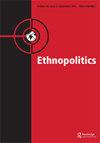Ciganos as a Traditional People: Romanies and the Politics of Recognition in Brazil
IF 1.2
Q3 ETHNIC STUDIES
引用次数: 3
Abstract
Abstract Within the Brazilian multicultural regime of recognition, Ciganos (Romanies) are recognised as belonging to ‘traditional peoples and communities’. The article discusses how this concept became applied to Ciganos raising questions of belonging, commonality and representation. It describes the emergence of novel ways of presenting one’s culture as distinct and even traditional among Calon Ciganos. It shows how demands to overcome invisibility, led to the creation of new spaces for dialogue with state institutions and reshaped how Calon politics are enacted. Finally, it describes the first successful case of guaranteeing Calon land rights.西卡诺作为一个传统民族:巴西的吉普赛人与承认政治
摘要在巴西多元文化的承认制度中,Ciganos(罗姆人)被认为属于“传统民族和社区”。文章讨论了这一概念是如何应用于Ciganos的,提出了归属、共性和代表性的问题。它描述了在Calon Ciganos中出现的将自己的文化呈现为独特甚至传统的新颖方式。它展示了克服隐形性的需求如何创造了与国家机构对话的新空间,并重塑了卡隆政治的实施方式。最后,介绍了第一个成功保障Calon土地权的案例。
本文章由计算机程序翻译,如有差异,请以英文原文为准。
求助全文
约1分钟内获得全文
求助全文

 求助内容:
求助内容: 应助结果提醒方式:
应助结果提醒方式:


